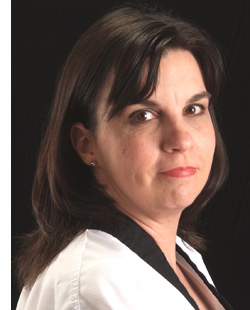
At last week’s Frontiers in Optics meeting, OSA member and thin-film consultant Jennifer Kruschwitz shared her advice about how to prepare for a career in consulting during a Minorities and Women in OSA event. Jennifer was recognized as Digital Rochester’s 2012 Technology Woman of the Year.
There are a lot of reasons why one might want to pursue a career in consulting. For me, self-employment was something I’d always wanted to do. It was in my nature: Both my parents and siblings owned their own businesses, and I viewed the prospect as familiar and doable.
Others might find that they’ve hit a wall in their current job; even though they always get excellent reviews at work, they consistently get passed over for promotions. For still others, consulting could be the option that allows them the flexibility they need to balance work and family or to circumvent the frustrating “two body” problem, in which professional couples must figure out how to live in the same geographic location when relevant jobs there are limited for one of them.
No matter what your reason, you’ll need to prepare well before embarking on your journey toward consulting by taking the following steps.
Gain expertise in your field. In whatever job you have, you can set the stage for a consulting career by becoming the go-to person for challenging tasks. Find ways to add value to any project you are involved with and learn how to be productive between projects, so your expertise is always growing. Also, the more you can publish and present your scientific work, the better. Getting your name out to the community is critical.
Build your network. As you build your reputation, grow your network as well. You’ll want to get to know not only other scientists, but other professionals in the small business community. Volunteering with professional societies is a great way to start.
Put yourself on solid financial footing. Try to start your business from a strong financial position. You can do this by reducing your personal debt and saving as much money as possible. Before you get started, you’ll need to research your rates so that you can justify them to your clients and yourself. If you set your rates too high, you may not get any business; it you set them too low, others may perceive your work to be of low quality. Finally, think about how willing you are to be flexible with clients based on their particular situations.
After you’ve taken the plunge, the next step is to build your business. You might pursue one of more of the following options.
Partner with a larger firm that doesn’t have your specialty. Keep on top of the businesses in your field and related areas so you can identify those that provide a good, strategic fit. Then set up a time to talk with a contact there about how you can work together to your mutual benefit.
Work for a previous employer on a contractual basis. This possibility is one reason you shouldn’t burn bridges when you leave any job. You can never count out any company as a potential client or partner down the line.
Complement your business with another form of income. Whether it is a teaching position or research gig, having another role can help sustain you financially while also contributing to your portfolio of skills.
By being prepared, you can position yourself strongly as a fledgling business. Don’t let a lack of confidence get in your way. If you are nervous about being a consultant … pretend you’re somebody else! You (or your alter ego) can do it!
Jennifer D.T. Kruschwitz (jkconsult@kruschwitz.com) is a Senior OSA member and principal optical coating design engineer at her own company, J.K. Consulting, Rochester, N.Y., U.S.A. She is also an adjunct professor at the University of Rochester and an adjunct associate professor at the University of Arizona.
